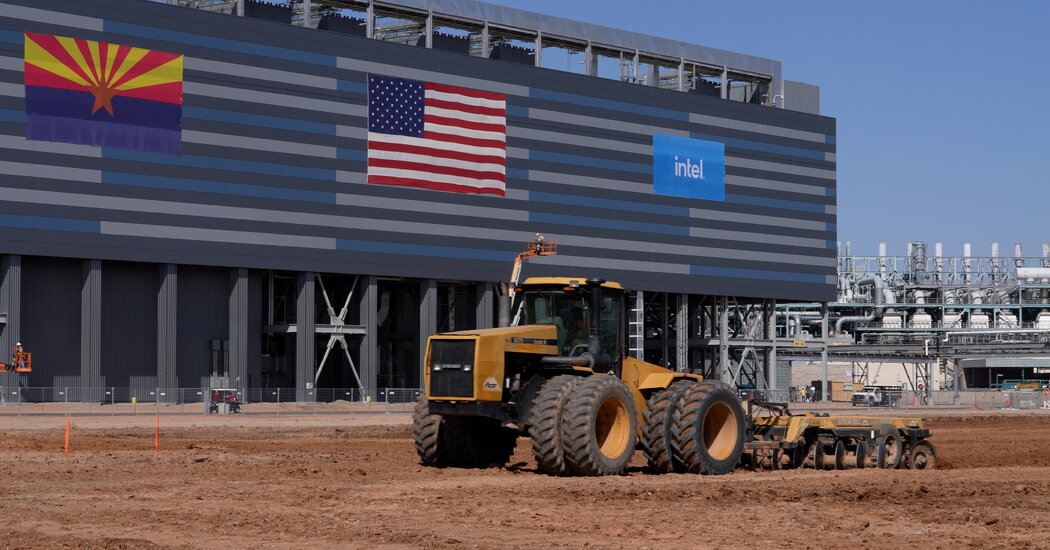
Intel has selected Ohio for a new chip manufacturing complex that would cost at least $20 billion, ramping up an effort to increase U.S. production of computer chips as users grapple with a lingering shortage of the vital components.
Intel said the new site near Columbus would initially have two chip factories and would directly employ 3,000 people, while creating additional jobs in construction and at nearby businesses, a person with knowledge of the matter said. But that is likely to be just the beginning.
Patrick Gelsinger, who became Intel’s chief executive last year, has rapidly increased the company’s investments in manufacturing to help reduce U.S. reliance on foreign chip makers while lobbying Congress to pass incentives aimed at increasing domestic chip production. He has said that Intel might invest as much as $100 billion over a decade in its next U.S. manufacturing campus, linking the scope and speed of that expansion to expected federal grants if Congress approves a spending package known as the CHIPS Act.
“We will go bigger and broader if it gets funded,” Mr. Gelsinger, 60, said in a recent interview. “But our recovery plans don’t rely on the CHIPS act.”
Intel’s move has geopolitical implications, as well as significance for supply chains. Chips, which act as the brains of computers and many other devices, are largely manufactured in Taiwan, which China has expressed territorial claims toward. During the pandemic, they have also been in short supply because of overwhelming demand and Covid-related disruptions to manufacturing and labor supply, raising questions about how to ensure a consistent chip pipeline.
Biden administration officials, who have aggressively pushed the CHIPS Act, are expected to discuss Intel’s announcement on Friday.
Intel has scheduled a webcast to discuss the expansion on Friday. The move is Intel’s first to a new state for manufacturing in more than 40 years. The company, based in Silicon Valley, has U.S. factories in Oregon, New Mexico and Arizona. Last March, Mr. Gelsinger chose an existing complex near Phoenix for a $20 billion expansion, which is now underway.
But Mr. Gelsinger had also asserted that a new location was needed to provide additional talent, water, electrical power and other resources for the complex process of making chips. Intel has combed the country for sites, prompting states to compete for one of the biggest economic development prizes in recent memory.
The site chosen for the new plant, in New Albany, a suburb east of Columbus, is in an area known for inexpensive land and housing. Nearby Ohio State University is a major source of graduates with engineering degrees whom Intel could recruit. Columbus is also centrally located for receiving supplies and for shipping finished chips.
The selection of the site was reported last week by The Plain Dealer and Cleveland.com. Intel confirmed the choice to Time on Thursday.
Mr. Gelsinger, a 30-year Intel veteran who became chief of the software maker VMware in 2012, returned to the chip maker last year to become chief executive as the semiconductor shortage began hobbling carmakers and other companies.
While the shortage was partly rooted in the pandemic, another long-term factor was the shifting of chip manufacturing to Asian countries that offer subsidies to companies that build factories there. The United States accounts for about 12 percent of global chip production, down from 37 percent in 1990. Europe’s share has declined to 9 percent from 40 percent over that period.
Many of the most advanced chips come from Taiwan Semiconductor Manufacturing Company, whose proximity to China has worried Pentagon officials.
Legislation passed by the Senate with bipartisan support last June would provide $52 billion in subsidies for the chip industry, including grants to companies that build new U.S. factories. The package has since gotten caught up in House bickering over the Biden administration’s priorities, though Mr. Gelsinger and others have said they are hopeful it will pass in the coming months.
In Europe, Mr. Gelsinger has also lobbied officials for a similar package of subsidies that could aid the construction of a big new Intel factory there, with a projected price tag comparable to the U.S. expansion.
Ohio has not previously had a chip manufacturing presence. Moving to a state without existing chip factories presents challenges, such as obtaining permits and persuading suppliers of gases, chemicals and production machines to set up nearby offices, said Dan Hutcheson, an analyst at VLSI Research. On the other hand, having plants in more states provides lobbying leverage in Washington, he said.
Intel is not the only company expanding U.S. production. T.S.M.C. began construction last year on a $12 billion complex about 50 miles from Intel’s site near Phoenix. Samsung Electronics selected Taylor, Texas, for a $17 billion factory, with construction set to begin in 2022.
Mr. Gelsinger’s strategy is based partly on a bet that Intel can rival T.S.M.C. and Samsung in manufacturing chips to order for other companies. For most of its existence, Intel has built only the microprocessors and other chips it designs and sells itself.
The strategy is risky, as Intel has fallen behind its Asian rivals in packing more circuitry onto each slice of silicon, which increases the capabilities of devices like smartphones and computers. Mr. Gelsinger has said that Intel is on track to catch up over several years, but it won’t be easy, as those companies continue to make new developments of their own.
Intel “is catching up, but they have not caught up,” Mr. Hutcheson said.




